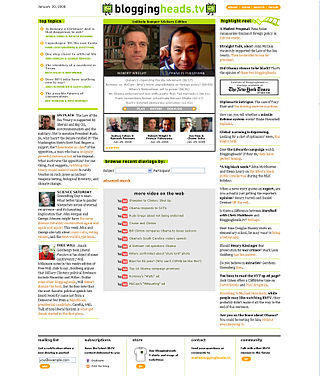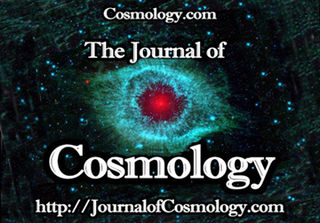A blog is a discussion or informational website published on the World Wide Web consisting of discrete, often informal diary-style text entries (posts). Posts are typically displayed in reverse chronological order so that the most recent post appears first, at the top of the web page. Until 2009, blogs were usually the work of a single individual, occasionally of a small group, and often covered a single subject or topic. In the 2010s, "multi-author blogs" (MABs) emerged, featuring the writing of multiple authors and sometimes professionally edited. MABs from newspapers, other media outlets, universities, think tanks, advocacy groups, and similar institutions account for an increasing quantity of blog traffic. The rise of Twitter and other "microblogging" systems helps integrate MABs and single-author blogs into the news media. Blog can also be used as a verb, meaning to maintain or add content to a blog.
The blogosphere is made up of all blogs and their interconnections. The term implies that blogs exist together as a connected community or as a social networking service in which everyday authors can publish their opinions.
Technorati was a search engine and a publisher advertising platform that served as an advertising solution for the thousands of websites in its network. Technorati launched its ad network in 2008, and at one time was one of the largest ad networks reaching more than 100 million unique visitors per month. The name Technorati was a portmanteau of the words technology and literati, which evokes the notion of technological intelligence or intellectualism.

RealClimate is a commentary site (blog) on climatology. The site's contributors include climate scientists whose goal is to provide a response to developing stories and a context they feel is sometimes missing in mainstream commentary on climate science and climate change. The forum is moderated, and is restricted to scientific topics to avoid discussion of political or economic implications of the science. RealClimate was launched on 10 December 2004 by nine climate scientists.
Cheri Pierson Yecke is an author and retired conservative Republican professor in the United States.
Weblogs, Inc. was a blog network that published content on a variety of subjects, including tech news, video games, automobiles and pop culture. At one point, the network had as many as 90 blogs, although the vast majority of its traffic could be attributed to a smaller number of breakout titles, as was typical of most large-scale successful blog networks of the mid-2000s. Popular blogs included: Engadget, Autoblog, TUAW, Joystiq, Luxist, Slashfood, Cinematical, TV Squad, Download Squad, Blogging Baby, Gadling, AdJab, and Blogging Stocks.
Pharyngula, a blog founded and written by PZ Myers, is hosted on ScienceBlogs and on FreeThoughtBlogs (2011–present). In 2006 the science journal Nature listed it as the top-ranked blog written by a scientist based on popularity. The blog addresses a range of topics, including Myers's academic specialty, biology. It has become particularly well known for Myers's writing style and for his criticism of intelligent design and creationism. In 2009, Hemant Mehta ranked Pharyngula the most popular atheist blog, based on subscriber levels and other factors.
Science Daily is an American website launched in 1995 that aggregates press releases and publishes lightly edited press releases about science, similar to Phys.org and EurekAlert!.

The Discovery Institute has conducted a series of related public relations campaigns which seek to promote intelligent design while attempting to discredit evolutionary biology, which the Institute terms "Darwinism." The Discovery Institute promotes the pseudoscientific intelligent design movement and is represented by Creative Response Concepts, a public relations firm.

Bloggingheads.tv is a political, world events, philosophy, and science video blog discussion site in which the participants take part in an active back and forth conversation via webcam which is then broadcast online to viewers. The site was started by the journalist and author Robert Wright and the blogger and journalist Mickey Kaus on November 1, 2005. Kaus has since dropped out of operational duties of the site as he didn't want his frequent linking to be seen as a conflict of interest. Most of the earlier discussions posted to the site involved one or both of those individuals, but since has grown to include a total of over one thousand individual contributors, mostly journalists, academics, scientists, authors, well known political bloggers, and other notable individuals.
Zooillogix is a zoology blog on the ScienceBlogs network, created and edited by Andrew and Benny Bleiman. The site has been featured on ABC News, in Seed magazine, Mental Floss, FHM, and the Annals of Improbable Research, awarders of the Ig Nobel Prize. The site attracts a diverse readership from notable scientists, such as PZ Myers, to biology students to young children.

Paul Zachary Myers is an American biologist who founded and writes the Pharyngula science-blog. He is associate professor of biology at the University of Minnesota Morris (UMM) where he works in the field of developmental biology. He is a critic of intelligent design and the creationist movement and other pseudoscientific concepts.

FDD's Long War Journal (LWJ) is an American news website, also described as a blog, which reports on the War on terror. The site is operated by Public Multimedia Incorporated (PMI), a non-profit media organization established in 2007. PMI is run by Paul Hanusz and Bill Roggio. Roggio is the managing editor of the journal and Thomas Joscelyn is senior editor. The site is a project of the Foundation for Defense of Democracies, where both Roggio and Joscelyn are senior fellows.

SmartPlanet was an online magazine that covered clean technology and information technology as it related to healthcare, science, transportation, corporate sustainability, architecture, and design. It was part of the business portfolio of CBS Interactive that included BNET and ZDNet and was known for its daily coverage of the technology and energy industries. It stopped publishing on June 30, 2014.
The courtier's reply is a type of informal fallacy, coined by American biologist PZ Myers, in which a respondent to criticism claims that the critic lacks sufficient knowledge, credentials, or training to pose any sort of criticism whatsoever. It may be considered an inverted form of argument from authority, where a person without authority disagreeing with authority is presumed incorrect prima facie.
Science Online was an annual conference held in Durham, North Carolina, Raleigh, North Carolina and Research Triangle Park, North Carolina, that focused on the role of the internet in science and science communication. It was attended primarily by bloggers and science journalists from North America.

The Journal of Cosmology describes itself as a peer-reviewed open access scientific journal of cosmology, although the quality of the process has been questioned. The journal has been closely related historically with a similar online website, Cosmology and Journal of Astrobiology and Space Science Reviews., as all three were founded by neuroscientist Rhawn Gabriel Joseph. Rhawn Joseph established the journal in 2009, published by Cosmology Science Publishers, and it was sold to Modern Cosmology Associates in 2011. Rudolph Schild is the editor-in-chief.

Ontogenetic depth is a pseudoscientific idea proposed in February 2003 by Paul Nelson, an American philosopher of science, young Earth creationist and intelligent design advocate; he is employed by the Discovery Institute.
Stuart Pivar is an American art collector from Brooklyn, New York known for being one of the founders of the New York Academy of Art along with Andy Warhol. Trained as a scientist, he has long endorsed the study of anatomy and need for artists to acquire technical skills. Pivar grew his fortune in the plastics industry and is also the author of several books.
Natural News is a far-right, anti-vaccination conspiracy theory and fake news website known for promoting alternative medicine, pseudoscience, disinformation, and far-right extremism. The website began publishing articles in 2008 and is based in the United States.







